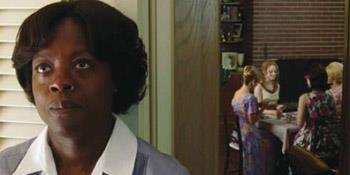Now, despite a modest budget ($25m) and a relatively unknown and almost entirely female cast, a film version has become an unpredicted box office smash in the US, grossing over $150m in its first five weeks of release. But is it merely a schmaltzy chick-flick, like so many other best-seller adaptations, or does The Help contain some depth and meaning?


The last time I cried during a film, Elliott was waving goodbye to ET. The Help reduced me to tears no fewer than seven times. It wasn’t the reaction I was expecting. Set in 1960s Mississippi, among the homes of well-off young white women and their poorly treated African-American maids, it’s hardly the sort of film I’d usually choose to watch. Yet it is both so compellingly told and so gently but firmly clear in its message that I found it profoundly affecting.
The story centres principally on two very different women. Aibileen (Viola Davis) is the long-serving maid to the neglectful Elizabeth, acting as stand-in mother to the toddler she has no interest in raising. Skeeter (Emma Stone) is the plucky, intelligent society girl who doesn’t fit, harbouring a dream of becoming a writer and spotting a Story That Needs To Be Told in the lives of Aibileen and her friends. Raised in a world where racial segregation is advocated as the natural order, Skeeter begins to suspect that all is not right in the treatment of these women, and begins interviewing them in the hope that she might be able to publish a book about their experiences. As those conversations unfold, reluctantly at first, she (and we) gain an insight into just how awful the commonplace treatment of black people was, barely 50 years ago.
As we watch this mistreatment, chiefly orchestrated by Skeeter’s ‘friend’, Hilly, it is again difficult not to have a physical reaction. I found myself repeatedly burrowing my nails into my palms as my fists clenched involuntarily at the behaviour of this devil in a summer dress, chillingly (but brilliantly) played by Bryce Dallas Howard. You cannot fail to be awestruck not only by the depth of her racism, but also that she (like so many real people) had convinced herself that it was righteous – even, in her own words, ‘Christian’.
On both sides of the divide, a claimed Christian faith is the moral basis for the character’s actions. The white society women believe that they have been given a divine right to superiority; the black servant women file each Sunday to a church led by the charismatic Preacher Green (David Oyelowo), who knowingly compels them to love their enemies in order to ‘have the victory’. This is not simplistic stuff, and at this, as with much of the film, we are forced to reflect on the modern context. There are still issues today on which substantial numbers of Christians stand on opposing sides – each group utterly convinced that they are in the right, that they are following God. Israel/Palestine, abortion, gay marriage and ordination, women in leadership, contraception…the list is sizeable. The Help doesn’t give us easy answers, but it does illustrate that both sides can’t be right.
As the story moves on, Skeeter quickly realises the urgency of what she is compiling and, at the risk of shattering the community that raised her, presses on in spite of ferocious opposition.
At its heart, then, The Help isn’t a film about racism (although it is striking and important to see racism portrayed in a non-masculine context), but a film about standing up for what is right. Skeeter never mentions God, but that’s no reason for Christians not to be inspired by her. The fact is that she spots deep injustice (one of the maids asserts at one point that they are already ‘living in hell’), and fights back – if that’s not the work of the kingdom, I don’t know what is.
The character and the story should inspire us to ask the same questions of our own culture. Skeeter apart, every white character in The Help is entirely blind to the culturally ingrained evil being perpetrated all around them. If we take a step back and look – like Wilberforce did – with kingdom eyes, could it be that there are similar issues around us? They might not be as slap-in-the-face obvious as blatant southern US racism, but they could be just as cancerous. The Help should inspire us to pray – to ask God to show us where things are not right; to bring us to tears over injustice.
And so, unavoidably, to those tears. Totally unexpectedly, The Help reduced me to a blubbering mess. There are laughs too, specifically around a brilliant denouement about which I daren’t reveal any spoiling details.
But by the end, your heart will have had more of a workout than your funny bone. Partly those tears come from sadness at the lives of the characters, but overwhelmingly they are inspired by a realisation that we live in a fallen world – one where great evil is done in Jesus’ name. The Help is a period film, but its themes are not still stuck in the past. Watch it, enjoy a wonderful piece of film-making, and let it inspire you to kingdom-bringing action.
The Help opens in the UK on 28th October.
Martin Saunders is the Editor of Youthwork magazine. You can follow Martin now@martinsaunders
This article was first printed in the November issue of Christianity magazine.




























